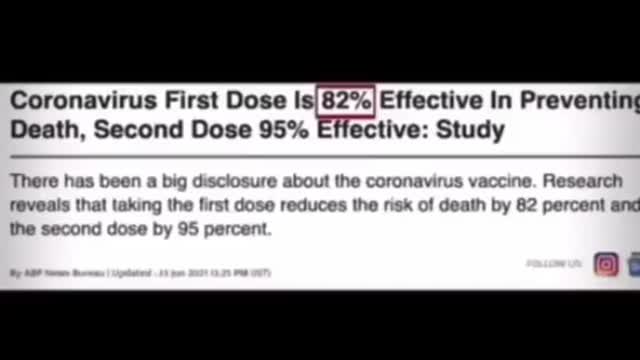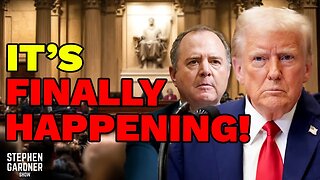Premium Only Content

Public health policy has been substantially corrupted by pharmaceutical interests.
They manufactured studies to enable greater profits, at the expense of citizens throughout the world.
We cannot allow this to happen again.The Greek word pharmakeia appears in Galatians 5:20 and Revelation 18:23. Terms from the same root word appear in Revelation 9:21, Revelation 21:8, and Revelation 22:15. These are typically translated into English as “sorcery,” “witchcraft,” or “sorcerer.” Ancient Greek uses of pharmakeia closely mirror the generic modern English word drugs ; the same Greek root word produced English terms such as pharmacy and pharmacist.
Modern use of the word sorcery evokes images of supernatural power and spells; biblical use of pharmakeia doesn’t fit well with such ideas. Rather, the term suggests various forms of drug abuse. Those might include drug use in pagan worship, as an addiction, or as a poison used to manipulate and control others.
In modern English, separate terms distinguish medicines, chemicals, and illicit drugs. As used in most contexts, a “pharmacist” and a “drug dealer” both distribute chemicals, but of different kinds and for drastically different reasons. Because English vernacular uses entirely different words, phrases like selling drugs evoke something illicit while taking meds or prescription drugs don’t imply anything nefarious. Ancient Greeks used words like pharmakeia to refer to that entire spectrum: from medicines to psychoactives to poisons. This makes cultural and biblical context crucial when interpreting terms related to pharmakeia.
Ancient societies were no stranger to mind-altering chemicals. Archaeologists note the presence of opium, hemp, and many other substances in Bible-era cultures. These compounds were not as potent as modern options but still capable of powerful effects. For example, synthetic drugs like carfentanyl are a hundred thousand times as powerful as an equivalent dose of natural opium—this is what allows a small dart to tranquilize an elephant. But opium itself is still a strong drug.
Mood-altering substances were also used in connection to ancient religious practices. Temples such as those in Greece sometimes used mind-altering drugs in fortune-telling and oracles. These may have included natural vapors and deliberately concocted mixtures. When Paul wrote Galatians and John recorded Revelation, these practices would have been part of pagan idolatry.
Substances that alter a person’s perceptions can be used as legitimate medicines (1 Timothy 4:4). They can also be abused for recreation. Even worse, they can be used in a predatory manner, influencing others and taking advantage of their skewed awareness. The biblical concept of “sorcery” seems to lean toward the latter end of this spectrum. A biblical “sorcerer” could be thought of as the equivalent of a modern “drug dealer.” Or as the type of person who slips chemicals into a woman’s drink to take advantage of her.
Galatians 5:20 is part of Paul’s list of contrasts to the fruit of the Spirit (Galatians 5:22–23). That list of works of the flesh (Galatians 5:19–21) does not appear to be random. The references are collected into groups of similar offenses. Paul begins by mentioning sexual sin, then idolatry, then “sorcery”—pharmakeia—and then division, before moving on to drunkenness and debauchery. His reference to pharmakeia is grouped closer to idolatry and sexuality than it is to drunkenness, which hints at the use of illicit drugs in ungodly spiritual practices.
John’s references might also be connected to pagan worship; Revelation 9:21 comes immediately after a condemnation of idolatry. Yet this reference also sits between mentions of murder and sexual sin. Revelation 18:23 is part of a condemnation of Babylon, referring to its “deception.” The phrasing closely echoes the statement of Nahum 3:4, which refers to “charms.” The Hebrew root word used in Nahum is kesheph. That is used in reference to idolatry and often translated as “sorcery,” and is seen in 2 Kings 9:22, Isaiah 47:9, 12, and Micah 5:12.
Combining these contexts, the exact meaning of pharmakeia isn’t crystal clear, but neither is it completely obscure. There’s no sense that Scripture uses terms such as pharmakeia in reference to supernatural powers. Instead, biblical “sorcery” seems to be about abusing drugs for idolatry, recreation, and/or oppression of others.
FOR FURTHER STUDY
-
 1:05:13
1:05:13
Sarah Westall
2 hours agoEU Falling, United States Barely Hanging on - Strength and Courage Needed to Fight for Free Speech
27.5K1 -
 LIVE
LIVE
LFA TV
11 hours agoLFA TV ALL DAY STREAM - TUESDAY 8/19/25
1,004 watching -
 2:11:18
2:11:18
The Quartering
5 hours agoToday's Breaking News! Disgusting Grocery Shopping "Haul" Goes Viral, Las Vegas Collapse & More
100K33 -
 DVR
DVR
StoneMountain64
5 hours agoBest Extraction shooter is FINALLY on Console (+CoD Reveal Today)
53.7K -
 3:04:51
3:04:51
Due Dissidence
7 hours agoZelensky RETURNS To DC, HUGE Protests In Israel, Gal Gadot Blames Palestine For Flop, MSNBC Rebrands
44.7K21 -
 1:19:29
1:19:29
The HotSeat
3 hours ago🚨 Dems Swear Mail-In Voting Is “Secure”… Trump Says HELL NO 🚨
22.3K10 -
 9:35:19
9:35:19
Reidboyy
9 hours ago $0.86 earnedNEW FREE FPS OUT ON CONSOLE TODAY! (Delta Force = BF6 Jr.)
31.6K -
 29:20
29:20
Stephen Gardner
3 hours ago🔥YES! Trump unleashes Democrats’ worst nightmare!
21.9K10 -
![[Ep 731] Trump Leading the World | Islam NOT Compatible with West | Guest Sam Anthony [your[NEWS](https://1a-1791.com/video/fww1/93/s8/1/c/n/K/a/cnKaz.0kob-small-Ep-731-Trump-Leading-the-Wo.jpg) LIVE
LIVE
The Nunn Report - w/ Dan Nunn
3 hours ago[Ep 731] Trump Leading the World | Islam NOT Compatible with West | Guest Sam Anthony [your[NEWS
82 watching -
 2:05:30
2:05:30
Side Scrollers Podcast
7 hours agoEveryone Hates MrBeast + FBI Spends $140k on Pokemon + All Todays News | Side Scrollers Live
88.1K4